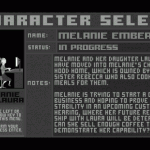When Games Matter is a weekly exploration by Drew Dixon of meaningful moments in games. Operating under the assumption that games do in fact matter, Drew seeks to highlight those moments that have much to say to say about who we are and the world we live in.
We like to save the world in videogames. We will probably never do anything in life that would accurately be described as such, thus it makes sense that we would gravitate to missions of cosmic significance in the virtual world. In Mass Effect we seek to save the universe from the collectors, in Skyrim we seek to save Tamriel from the threat of deadly dragons, and in the various Zelda games we save the world from Gannon and his minions who always seem to have found some strange way of making the world decidedly worse.
There is an obvious parallel to the Christian story. As Christians we believe that the world is deeply flawed as evidenced by its rampant sickness, strife, and suffering. Jesus understood the world’s deeply etched flaws–this is why he healed the sick, cast out demons, and wept with Lazarus’s family at his death. Jesus did not look upon the world’s problems with disgust but with concern, compassion, and determination. Jesus is Christianity’s cosmic answer to the world’s deepest flaws both in his promise to make all things new (Rev. 21:5) and in his willingness to go to the cross (Heb. 2:2).
Such cosmic salvation is an essential element of the Gospel, yet as I recently reread the gospels, I was struck by how often Jesus’ earthly ministry delved into the deeply personal. Jesus seeks out a single tax collector and dines with him, he talks speaks frankly with the woman at the well about her sexual immorality, and engages the rich young ruler about his wealth. Of course these stories are about more than extortion, sexual immorality, and the seduction of riches, but Jesus constantly got personal with real people about real problems. He doesn’t cut off the Samaritan woman as she confided about her immorality. Jesus listened and responded with grace.
Jesus came to make all things new; he is the bread of life, the light of the world, king of kings, and Lord of lords but he also cared about the rich young ruler’s unhealthy affections for his own wealth–Jesus loved this young man (Mark 10:21). Such stories tell us individuals matter to Jesus. The Jesus story is deeply personal–in fact small, individual victories seem to be essential to the accomplishment of his cosmic mission (Luke 15:7; 19:10).
In reviewing the games that I have enjoyed lately, I noticed a common thread–they addressed more personal stories and neglected to delve into cosmic forms of salvation. I gravitate to such stories because they seem more reasonable and more likely to produce empathy in us. I don’t have the slightest idea of what it would be like to be abused by one’s mother but I feel deeply for the little boy protagonist in The Binding of Isaac. As I guide him through his basement seeking to escape his deranged mother, I begin to feel deeply for him. I have no hope of ridding the world of child abuse but I do have a real sense that I could save this one little boy, and I think that counts for something. Similarly, I recently played through Dear Esther and though I don’t understand the feelings of loss that my character is experiencing at the loss of a loved one at the hands of a drunk driver, I care.
Thus when I reached the end of Bastion and learned that I could rewind time and undo humanity’s greatest act of destruction, I was torn. I had grown to know and love Rucks and Zia, and I even had compassion on my enemy Zulf–I had gone out of my way to save him despite his disdain for my mission. Saving the world can be pretty bland if you don’t have a reason to care deeply for the people in it. Thus Bastion confronted me with a unique decision–one in which “saving the world” would mean undoing everything that had given it significance.
Being able to effectively wipe out universal evils in the virtual world is often delightful. I understand the appeal and believe there is value to such an experience. However, I can’t wait to play Mass Effect 3 not because of the opportunity to wipe out the collectors but because I am hoping that the decisions I made in the first two games are going to matter. It’s more important to me to personally save Shepherd by earning the respect and trust of his crew. Thus I find the more personal elements of games encouraging. I know I will never save the world but I am reminded that my small actions and attempts at making a difference matter.











